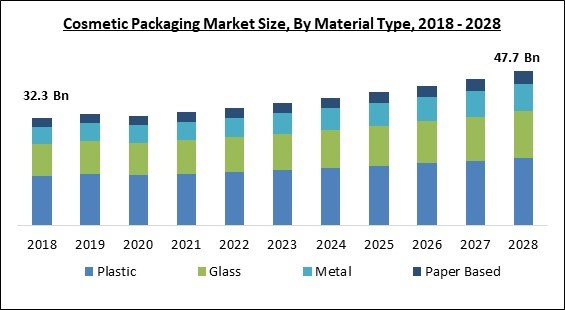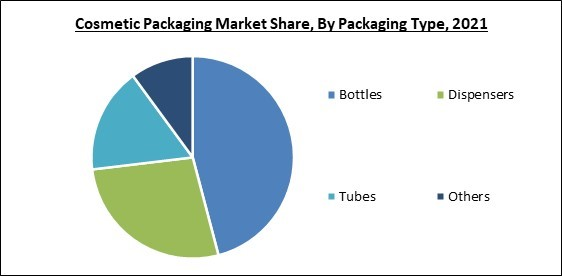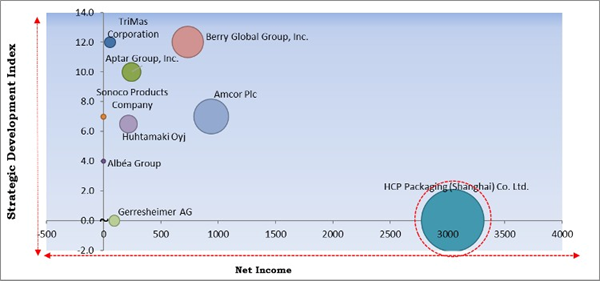Cosmetic packaging is important in the marketing of various cosmetics items since it attracts the attention of the buyer. To make the packaging appealing, different graphical and packaging designs are essential. This refers to both primary and secondary packing. Paper and board-based packaging is commonly used for secondary packaging due to its ease of processing and ability to be customized to meet specific needs.
In the projected future, the market is expected to be driven by changing packaging styles, novel package designs, and rising demand for cosmetics due to the growing youth population. Furthermore, the market is expected to be driven by rising demand for cosmetics as a result of changing grooming habits across both genders during the forecast period. For the sale of cosmetics, producers rely on significant advertising through various media. Packaging innovation is a vital aspect in attracting customers, and it will have an impact on the packaging industry's overall growth in the next years.
Furthermore, because of rising disposable money and changing lifestyles, emerging economies such as China and Japan are presenting a great chance for the cosmetic sector to grow. As a result, rising cosmetics demand has a direct impact on the market for this industry, boosting the market expansion over the predicted period. As the number of new entries into the cosmetics sector grows, so does product and packaging innovation in order to obtain a competitive advantage. These are some of the major drivers expected to propel the cosmetics packaging industry forward throughout the forecast period.
COVID-19 Impact Analysis
Cosmetic shop income decreased by a significant margin in the early phases of the COVID-19 pandemic, according to the business of Fashion and McKinsey and Company. The disruption of the value chain has had a substantial influence on market growth; however, corporations are adopting new ways to cope with the new limits, mitigate the impact of the worldwide pandemic, and adapt to changing customer preferences. Manufacturers intend to take advantage of new technologies and implement strategies that will result in fundamental and long-term changes.Market Growth Factors
Gives Information Regarding the Product
Consumers may learn everything they need to know about a product from the label, including how to use it and where it came from. Companies mention the contents as well as the product's function, especially if it is uncertain. The contact information for the entity responsible for putting the product on the market is typically included on the label. Labels also serve as a source of product tracking data. The labels are simple to read, especially for customers who are viewing the product. Some mixtures, such as perfumes, might be specified as a single ingredient. The customer perceives secondary packages as the outermost package. The secondary package contains the primary packages. Certain details may only display on secondary packages. The most relevant information must be provided on both the primary and secondary packaging, especially if the product is prone to misuse.Cosmetic Packaging is an Important Part of Marketing
In today's cosmetic market, for example, when there is so much competition, it has never been more important to guarantee that the product is packaged in high-quality, unique, attention-grabbing, and highly efficient packaging. Packaging that is both attractive and functional will go a long way toward ensuring the company's success in the cosmetics market. Packaging is what attracts a consumer first and foremost. Additionally, the use of cosmetic products has grown exponentially and there are a variety of cosmetic products a person uses in a day. These products take a reasonable amount of space and thus the consumers want the packaging to be beautiful and immaculate.Market Restraining Factors
Negative Environmental Impact of Cosmetic Packaging
Plastics are the most commonly utilized packaging material in this business, with the majority of it ending up in landfills. According to the EPA (Environmental Protection Agency), around 70% of the plastic trash generated by the cosmetics industry is not recycled and instead ends up in landfills. Furthermore, the majority of the main packaging is composed of single-use plastic paper, with a considerable number of them being multilayered to give them a more premium appearance, adding to the excessive usage of plastics. Microbeads, little plastic particles used to exfoliate in rinse-off personal care products, were also shown to be inflicting major damage to the marine environment and other water bodies.Material Type Outlook
Based on Material Type, the market is segmented into Plastic, Glass, Metal, and Paper Based. The plastic segment acquired the largest revenue share in the cosmetic packaging market in 2021. This is owing to its ease of use and sanitary features. The inexpensive cost of plastic is one of the key reasons for its popularity. It's also light, flexible, unbreakable, and long-lasting. Furthermore, it is odorless and pleasing to the eye.Application Outlook
Based on Application, the market is segmented into Skin Care, Hair Care, Perfume, Oral Care, and Others. The hair care segment procured a significant revenue share in the cosmetic packaging market in 2021. Hair care product adoption is fast expanding in emerging economies like India and China, which is expected to drive the hair care industry. There are also a variety of hair care products available now, from shampoos to hair dyes to hair oils and serums.Packaging Type Outlook
Based on Packaging Type, the market is segmented into Bottles, Dispensers, Tubes, and Others. The bottles segment acquired the largest revenue share in the cosmetic packaging market in 2021. Acrylic bottles with matching jars are attractive and can be used to store healthy body creams or facial treatments. PP airless bottles can also be used to store creams and lotions. They are, nevertheless, less expensive to manufacture and lighter in raw plastic material. Acrylic airless bottles are a combination between polypropylene airless containers and complete acrylic airless bottles.Regional Outlook
Based on Regions, the market is segmented into North America, Europe, Asia Pacific, and Latin America, Middle East & Africa. The APAC region acquired the largest revenue share in the cosmetic packaging market in 2021. China is one of the largest cosmetics markets in the world. The rapid rise in disposable income, together with the growing number of young people, is predicted to promote cosmetics consumption in the country and the surrounding regions. As social media influencers have greater ways to reach out to young people and influence them on social media platforms, digital transformation is considerably propelling market growth in the region.Cardinal Matrix-Cosmetic Packaging Market Competition Analysis
The major strategies followed by the market participants are Acquisitions. Based on the Analysis presented in the Cardinal matrix; HCP Packaging (Shanghai) Co. Ltd. is the major forerunner in the Cosmetic Packaging Market. Companies such as TriMas Corporation, Berry Global Group, Inc. and Aptar Group, Inc. are some of the key innovators in the Market.
The market research report covers the analysis of key stake holders of the market. Key companies profiled in the report include Albéa Group, HCP Packaging (Shanghai) Co. Ltd., TriMas Corporation, Graham Packaging Company, Amcor Plc, Sonoco Products Company, Huhtamaki Oyj, Berry Global Group, Inc., Aptar Group, Inc., and Gerresheimer AG.
Strategies deployed in Cosmetic Packaging Market
Acquisitions and Mergers:
- Mar-2022: TriMas completed the acquisition of Intertech Plastics, a leading injection molding company specializing in manufacturing precision plastic parts for the medical, packaging, industrial, and consumer goods industries. The acquisition of Intertech solidified TriMas Corporation's portfolio and know-how in the Life Sciences market and enabled it to better serve its current customers and further expand its customer base.
- Jan-2022: Sonoco acquired Ball Metalpack, a leading manufacturer of sustainable metal packaging for food and household products and the largest aerosol can producer in North America. Ball Metalpack was a joint venture owned by Platinum Equity and Ball Corporation.
- Aug-2021: Huhtamaki completed the acquisition of Elif, a global sustainable flexible packaging supplier. The acquisition was in line with Huhtamaki’s 2030 growth strategy and was planned to solidify its position in developing markets and grow its flexible packaging business and product range.
- Feb-2020: Aptar Group acquired Fusion Packaging, a leader in high quality, prestige airless and color cosmetics packaging, and conception-to-launch turnkey solutions for the North American beauty market. The acquisition of Fusion Packaging was a fabulous addition to Aptar Group's North American business with huge potential for scalability in Europe and other regions. Additionally, the acquisition strengthened Aptar's forbidding portfolio by widening its agile design and full-service beauty packaging capabilities.
Product Launches and Product Expansions:
- Jan-2022: Amcor released AmFiber, a new line of paper-based packaging products. Amcor aimed to provide a variety of functional advantages to fulfil consumers’ increasing demands through the release of the AmFiber platform. The innovative solution was developed to offer greater protection from oxygen and moisture.
- Jul-2021: Sonoco launched its recyclable Sonopost packaging technology in Europe. The company added a Sonopost manufacturing operation to its facility in Sochaczew, Poland, utilizing its pre-existing manufacturing infrastructure for the expansion. With their industry-leading Sonopost technology, Sonoco had the prerogative of assisting manufacturers to make significant progress towards their sustainability goals.
- Apr-2021: Aptar Group released Star Drop, a unique hybrid packaging with a patented smart valve technology providing a very precise dose at each use. The product enabled Aptar to capitalize on the rising trend of “skinimalism” and the evolution of more lightweight, water-like foundations with sheer and natural finishes.
- Oct-2020: Berry Global launched Divinity HDPE, a new 2-inch flip-top tube closure made from high-density polyethylene (HDPE) that, when paired with one of their squeezable polyethylene (PE) tubes, creates a sustainable single-substrate package. Berry performed Association of Plastics Recyclers (APR) Critical Guidance testing to confirm the recyclability of its tubes with HDPE bottles.
- Jul-2020: Aptar Beauty + Home released Micro ECO and Mezzo ECO. Both products incorporate up to 45% post-consumer recycled resin (PCR) in the combined components and are Cotrep certified for eco-design. Aptar’s whole line of locally-produced airless solutions are 100% plastic and ECO-Cert certified, offer optimal formula protection, and are compatible for various application fields like skin, hair and body care, color cosmetics, and hand sanitizer. Customers can transform the current Micro and Mezzo top-fill package in a range of colors and sizes through Aptar’s extensive PCR supply.
- Jun-2020: Berry Global launched the Infinity Quartz range of premium jars for cosmetic and beauty products. The company released the new range with different materials, including post-consumer recycled (PCR) plastic, finishes, and decoration options to meet several product characteristics and branding objectives.
Partnerships, Collaborations and Agreements:
- May-2022: Berry Global formed a partnership with Koa, a skincare company. Under the partnership, both companies released Body Cleanser & Body Moisturizer bottles and closures made from 100% recycled plastic. The new PET bottles that are manufactured at Berry’s manufacturing facility in Winchester Virginia, are made from 100% PCR and silk-screen decoration to circumvent the need to account for label materials in the recycling process.
- Nov-2021: Albea formed a partnership with Royal DSM, a global purpose-led science-based company. Under the partnership, both companies aimed to bring sustainable packaging for their sun care formulation prototypes and achieve their goal of providing a fully sustainable sun care offering to customers.
- Jul-2021: Huhtamak formed a partnership with LyondellBasell, Plastuni Lisses (Groupe Somater), and Groupe Rocher. Huhtamaki had made a significant technological breakthrough in creating next-generation sustainable tube laminates. Under the partnership, the three companies released a tube laminate with more than 40% recycled content from renewable plastics. The laminate is mainly suitable for product applications in the cosmetics, personal care, oral care, and food sectors. The new laminate made a substantial contribution to fully circular flexible packaging solutions for these sectors.
Scope of the Study
Market Segments Covered in the Report:
By Material Type
- Plastic
- Glass
- Metal
- Paper Based
- Skin Care
- Hair Care
- Perfume
- Oral Care
- Others
- Bottles
- Dispensers
- Tubes
- Others
- North America
- US
- Canada
- Mexico
- Rest of North America
- Europe
- Germany
- UK
- France
- Russia
- Spain
- Italy
- Rest of Europe
- Asia Pacific
- China
- Japan
- India
- South Korea
- Singapore
- Malaysia
- Rest of Asia Pacific
- LAMEA
- Brazil
- Argentina
- UAE
- Saudi Arabia
- South Africa
- Nigeria
- Rest of LAMEA
Key Market Players
List of Companies Profiled in the Report:
- Albéa Group
- HCP Packaging (Shanghai) Co. Ltd.
- TriMas Corporation
- Graham Packaging Company
- Amcor Plc
- Sonoco Products Company
- Huhtamaki Oyj
- Berry Global Group, Inc.
- Aptar Group, Inc.
- Gerresheimer AG
Unique Offerings from the Publisher
- Exhaustive coverage
- The highest number of Market tables and figures
- Subscription-based model available
- Guaranteed best price
- Assured post sales research support with 10% customization free
Table of Contents
Companies Mentioned
- Albéa Group
- HCP Packaging (Shanghai) Co. Ltd.
- TriMas Corporation
- Graham Packaging Company
- Amcor Plc
- Sonoco Products Company
- Huhtamaki Oyj
- Berry Global Group, Inc.
- Aptar Group, Inc.
- Gerresheimer AG











